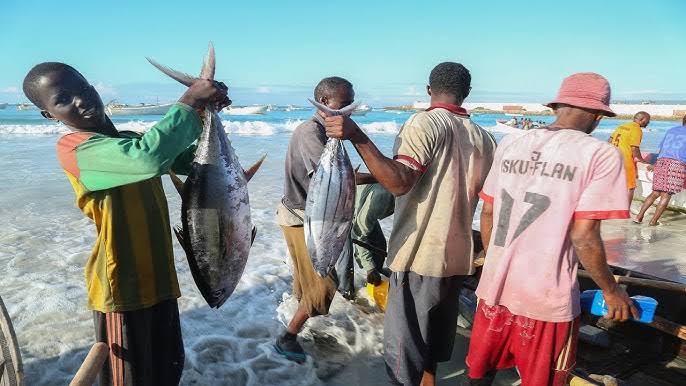Facebook Twitter (X) Instagram Somali Magazine - People's Magazine
Somalia’s fisheries, including its prized yellowfin tuna stocks, face an existential threat from illegal, unreported, and unregulated (IUU) fishing. A report from ENACT Africa, a European Union program combating transnational organized crime, sheds light on how IUU fishing devastates marine ecosystems, threatens local livelihoods, and highlights glaring weaknesses in Somalia’s maritime governance.
Somalia, home to the longest coastline in continental Africa and some of the Indian Ocean’s most fertile fishing grounds, has become a hotspot for foreign exploitation. Vessels from countries like China, Iran, and Pakistan employ destructive methods, including bottom trawling and fish-aggregating devices (FADs), to overexploit marine resources. These practices have caused significant environmental harm and depleted fish stocks, especially yellowfin tuna, a species critical for Somalia’s economy and global food security.
Designated as overfished by the Indian Ocean Tuna Commission (IOTC) in 2015, yellowfin tuna populations risk collapsing without urgent intervention. Experts predict a 70% decline within the next decade if current trends persist, which would devastate Somalia’s fisheries-dependent communities. However, conservation efforts by the IOTC remain undermined by influential member states, including the European Union, which resist stricter measures.
Illegal fishing has historical links to piracy along Somalia’s coastline, with local gangs often justifying their activities as retaliation against resource theft. Decades of civil conflict and weak governance have left Somalia ill-equipped to enforce maritime regulations. Despite the Somali Federal Fishery Law’s strict provisions against IUU fishing, enforcement is frequently undermined by corruption, limited resources, and regional-federal disputes.
One notable example of these governance challenges is the Puntland regional government’s defiance of federal directives to deny fishing licenses at the state level. Puntland argues that federal measures violate resource-sharing agreements, creating loopholes that foreign vessels exploit. A 2018 agreement permitting Chinese companies to fish within 24 nautical miles of Somalia’s coast further highlights systemic failures. By 2019, reports surfaced that the Liao Dong Yu fleet, a Chinese vessel, operated outside these boundaries, obtaining licenses from Puntland authorities under questionable circumstances. Allegations of political favoritism involving prominent figures, such as businessman and senator Dahir Ayande, further illustrate how corruption undermines Somalia’s fisheries sector.
Chinese vessels remain central to illegal tuna fishing along Somalia’s coast, employing unsustainable techniques like purse seines, longlines, and bottom trawling. These methods deplete fish stocks and inflict irreversible damage on marine ecosystems, jeopardizing the livelihoods of local fishing communities. Even more destructive practices, such as dynamite fishing, indiscriminately kill marine life, exacerbating the crisis.
The transnational nature of IUU fishing complicates enforcement efforts, as these activities often intersect with organized crime, money laundering, and human trafficking. However, Somalia has taken some steps to combat illegal fishing. Measures include banning trawling in federal waters, increasing licensing transparency, and collaborating with international partners like Turkey, Denmark, and the United Nations Office on Drugs and Crime (UNODC). These efforts have led to fines for violators and the seizure of illegal vessels.
Despite these initiatives, challenges persist. Reports suggest that Turkish fishermen continue operating in Somali waters under a bilateral agreement, raising questions about enforcement consistency. Experts like Robert McKee, a global maritime security advisor, emphasize the need for advanced monitoring technologies and regional task forces to address these issues effectively. McKee advocates for bold actions, including seizing illegal vessels, arresting offenders, and confiscating prohibited equipment, as critical steps toward safeguarding Somalia’s fisheries.
Illegal fishing costs Somalia an estimated $300 million annually, depriving the nation of vital revenue and endangering its food security. The crisis underscores the urgent need for coordinated efforts to strengthen maritime governance, enhance enforcement, and protect marine ecosystems. Without decisive action, Somalia risks losing not only its yellowfin tuna stocks but also the livelihoods and futures of countless communities dependent on its fisheries.

